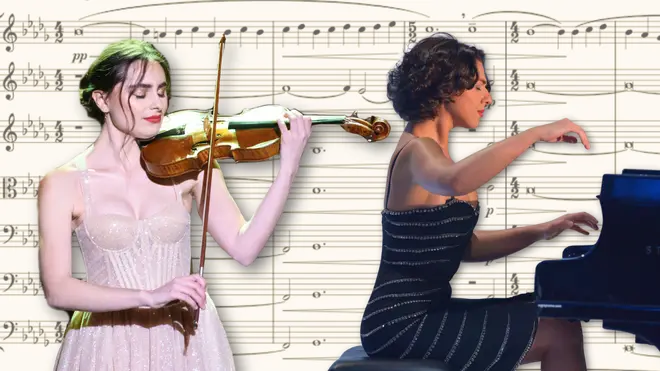10 most beautiful and moving pieces of classical music
29 September 2023, 16:19 | Updated: 5 February 2024, 17:58

Beautiful classical music has the power to soothe and bring solace. Here are ten of the pieces guaranteed to do just that.
Listen to this article
Loading audio...
The most beautiful classical music has the power to calm and console, and to truly transport us.
And some pieces of music that are written, dreamt up and notated sometimes hundreds of years ago, seem just impossibly beautiful. It seems improbable and nothing short of awe-inspiring that they were ever conceived.
Though these works run into their many – and we hope you go on to discover them in their multitudes – we have attempted to pick some of our very favourite of these indescribably beautiful and moving pieces of classical music.
Read more: 10 pieces of classical music that will 100% change your life
-
Albinoni-Giazotto: Adagio for Strings and Organ in G minor
Baroque composer Tomaso Albinoni’s Adagio for Strings, resurfaced in 1945 by the Italian academic Remo Giazotto, is a revolving, repeating loop of loveliness. It aches with longing and, with its organ and string texture, seems to literally pull feelings out of you.
Written in the brooding minor, it’s incredibly rich, expansive and lyrical. The melody cycles through stately, syncopated sequences that step achingly downwards, circling up in small moments of hope, before swooping weightily down again with a profound beauty.
The music is unquestionably tear-jerking, but that streak of hope is palpable throughout the whole thing, even the passages that take us to the deepest depths of human despair.
Irresistible.
Listen on Global Player: Classic FM Relax live playlist

Tomaso Albinoni - Adagio (best live version)
-
Samuel Barber: Adagio for Strings
Another Adagio for Strings, this one from a totally different era (or not, if you take the above Adagio as more the result of its discoverer, Giazzotto) but seems to pick up where Albinoni’s hypnotising work left off.
Like the Albinoni-Giazzoto work, Barber’s Adagio is deliciously rich and circles around heaving phrases that ache with beauty.
Barber wrote the beautiful Adagio as the second movement of his Op. 11 string quartet in 1936 but, at the recommendation of conductor Arturo Toscanini, turned the work into a work for string orchestra, giving it even more depth and lusciousness.
We’re so glad he did.
Read more: 11 of the most relaxing pieces of piano music

Vienna Philharmonic – Barber: Adagio for Strings, Op.11 (Summer Night Concert 2019)
-
Arvo Pärt: Spiegel im Spiegel
Estonian composer Arvo Pärt’s Spiegel im Spiegel is a masterclass in stillness and beauty.
Originally composed for violin and piano, the work is named “mirror in the mirror” and it adheres to “utmost clarity and strictness”, to use the words of the Arvo Pärt Centre.
The piano line contains smooth repeated patterns of three notes, while the violin part – or the cello part, as you’ll hear in the example below – sings through beautiful sustained notes.
As simple in conception as the work appears on the surface, its clarity creates music that is profoundly moving.

Spiegel im Spiegel for Cello and Piano (Arvo Pärt)
-
Bach: ‘Erbarme dich, meine Gott’ from St Matthew Passion
Going back to the Baroque era now, and truly Baroque, we find one of the most beautiful and moving pieces of music written by J.S. Bach: the aria that pleads ‘Have mercy Lord, My God’, during the second part of Bach’s oratorio, St Matthew Passion.
The solo violin carries a sublime melody that is picked up an alto or countertenor voice, before the two weave in and out of each other in the most sublime duet.
The swelling phrasing, and the rise and fall of the line, give the main melody an absolutely soul-wrenching beauty.

JS Bach: St Matthew Passion | Erbarme Dich, mein Gott | Iestyn Davies & Academy of Ancient Music
-
Pergolesi: Stabat Mater
Sticking with large scale choral works for a moment, and Italian Baroque composer Giovanni Battista Pergolesi’s Stabet Mater has to be one of the most beautiful ever written.
Composed in the final weeks of Pergolesi's life, the setting of the Christian “stabat mater” or “sorrowful mother” hymn depicting Mary’s suffering at the crucifixion of Jesus, is scored for soprano and alto soloists with strings and continuo.
Eighteenth-century philosopher and writer Jean-Jacques Rousseau called the opening movement of the work “the most perfect and touching duet to come from the pen of any composer.” We have to say we agree.

Pergolesi Stabat Mater Fabio Biondi Jennifer O'Loughlin Sara Mingardo
-
Beethoven: Cavatina from String Quartet in B flat major
Beethoven wrote his B flat major String Quartet, including its sublime ‘Cavatina’ fifth movement, in 1826, at a time when his life was turbulent with struggles around health and family relationships.
The beautiful work is said to have affected Beethoven more than anything he had ever written, and apparently he shed tears as he wrote the moving piece.
“Over a gently pulsating rhythm from the three lower strings, the first violin sobs,” is how presenter John Suchet summarises the elaborate piece of music. “In the fragmented notes there is anguish and despair.”

Beethoven String Quartet in B-flat major, Op. 130: V. Cavatina (arr. for Strings)
-
Hans Zimmer: ‘Cornfield Chase’ from Interstellar
From a work riven with complexity and heartache, to one of heart-stopping simplicity and beauty: film composer Hans Zimmer’s soundtrack for Interstellar.
Written for a scene framed by shimmering crops of corn and dusty roads, in which protagonists hunt a satellite in a rattly old car, the ‘Cornfield Chase’ theme is one that evokes feelings of awe and wonder at the forces bigger than us.
The building blocks are a stunningly simple melody that seesaws between pairs of notes, and an accompaniment that becomes more and more layered, until the music is frantic with evocative meaning and urgency.
The stunning piece has become a modern film classic, and was the second most popular piece of Hans Zimmer’s in this year’s Classic FM Hall of Fame.

Hans Zimmer - INTERSTELLAR THEME (Live in Prague) | HD
-
Purcell: ‘When I am laid in earth’ (‘Dido’s Lament’) from Dido and Aeneas
From Earth’s demise to demise that leads inevitably to the earth in a more grounded sense, there’s little more beautiful than the lament from Purcell’s 1689 opera Dido and Aeneas.
Surely unsurpassed in all English opera, this melancholic aria sings Dido to her tragic death: “Remember me,” she sings, “Remember me, but ah! forget my fate.”
Only the most beautiful melody is worthy of such poignant lyrics.

Henry Purcell "Dido & Aeneas" [extrait] - Les Arts Florissants, William Christie
-
Ralph Vaughan Williams: The Lark Ascending
Another English great: Vaughan Williams over 230 years later composed what would become one of the most enduringly popular pieces of classical music today.
The Lark Ascending, based on a poem of the same name by George Meredith which begins, “He rises and begins to round, He drops the silver chain of sound…”, evokes so viscerally the English countryside.
From a tentative start, the violin solo glides and flits into full song with the accompanying orchestra as it traces the flight of a morning lark in early morning.
The beautiful work is, for many, quintessentially English and, well loved, it has topped the Classic FM Hall of Fame numerous times.
British violinist Tasmin Little OBE, who has performed it “over 60 times”, says of The Lark: “The idea of this little bird in this huge sky, soaring closer and closer to heaven… I think there’s something very spiritual about this concept, and such peace and tranquillity in the music that it helps us to find our own sense of peace inside.”

Jennifer Pike: The Lark Ascending | National Portrait Gallery Sessions | Classic FM
-
Rachmaninov: Piano Concerto No. 2
One of the greatest Romantic Piano Concertos ever written, the ‘Rach 2’ is just sublime. Every memorable phrase, swelling string section, and weighty piano chord is beautifully placed to make the concerto an affecting and dramatic masterpiece.
The music is as lyrical and moving as it is monstrously virtuosic. Epic, unforgettable, it’s Russian orchestral writing at its most moving.
This is music for an existential, awe-filled few moments of listening.

Rachmaninoff: Piano Concerto no.2 op.18 - Anna Fedorova - Complete Live Concert - HD









































